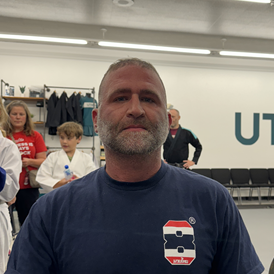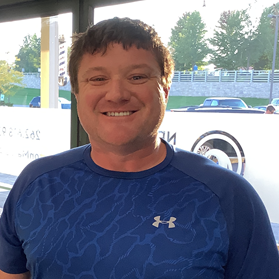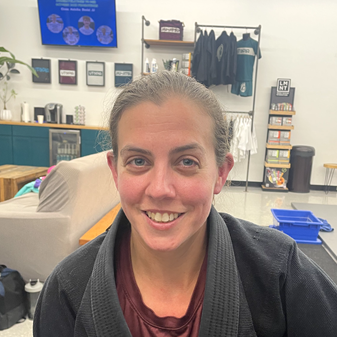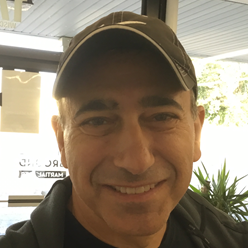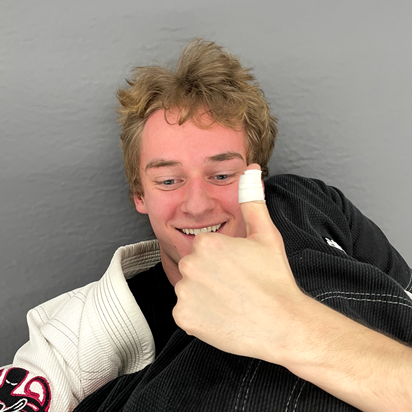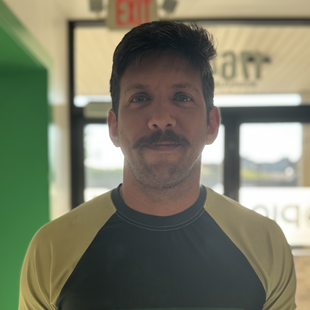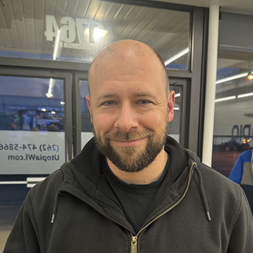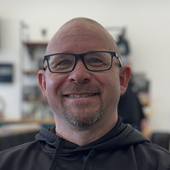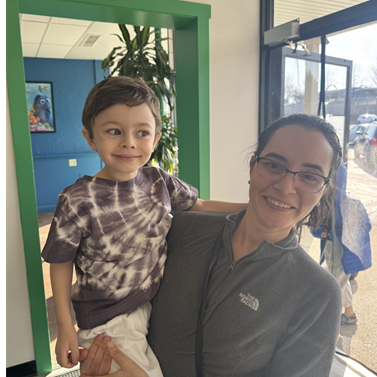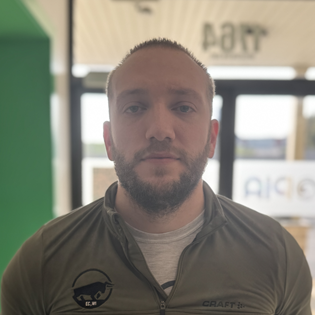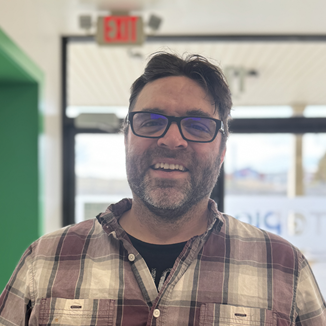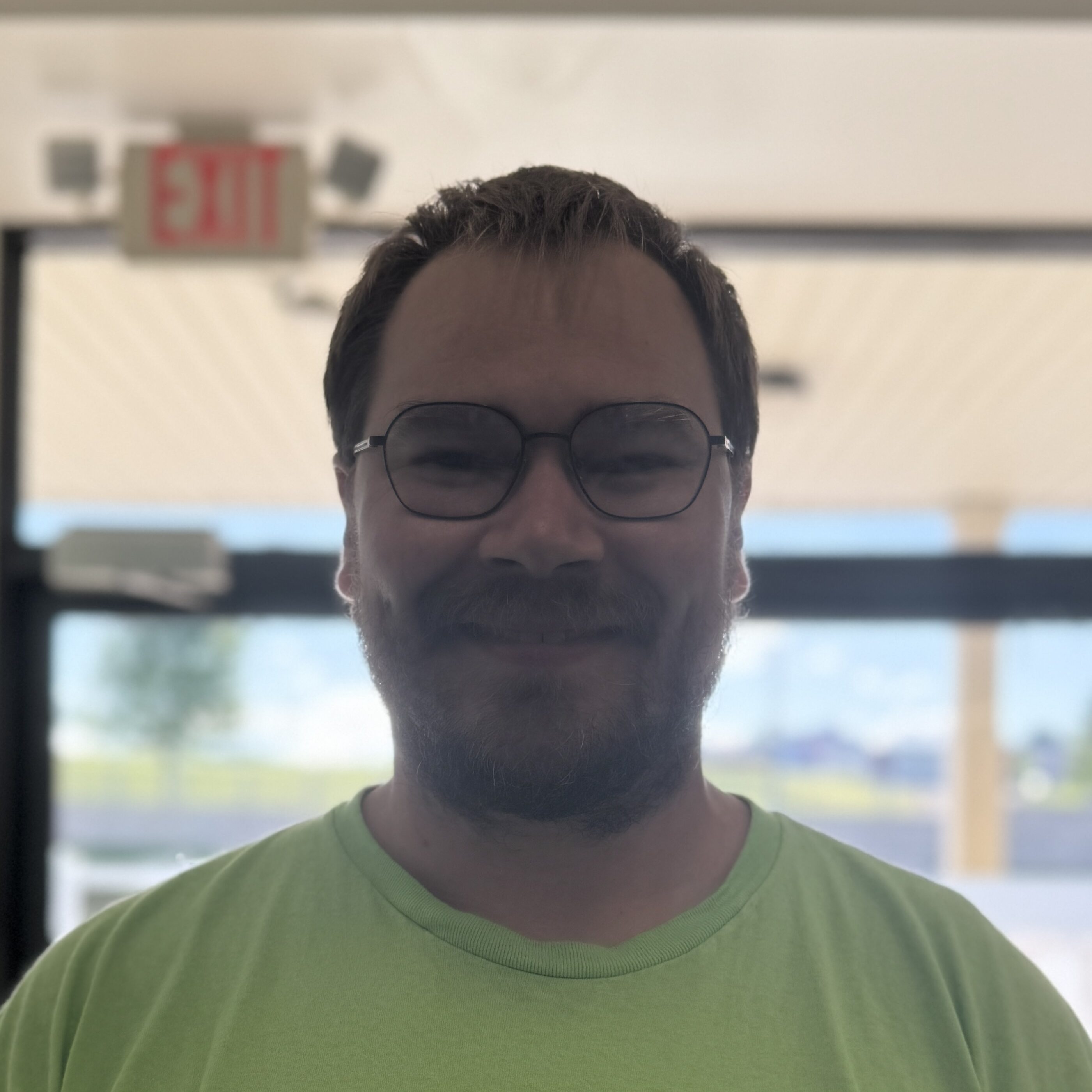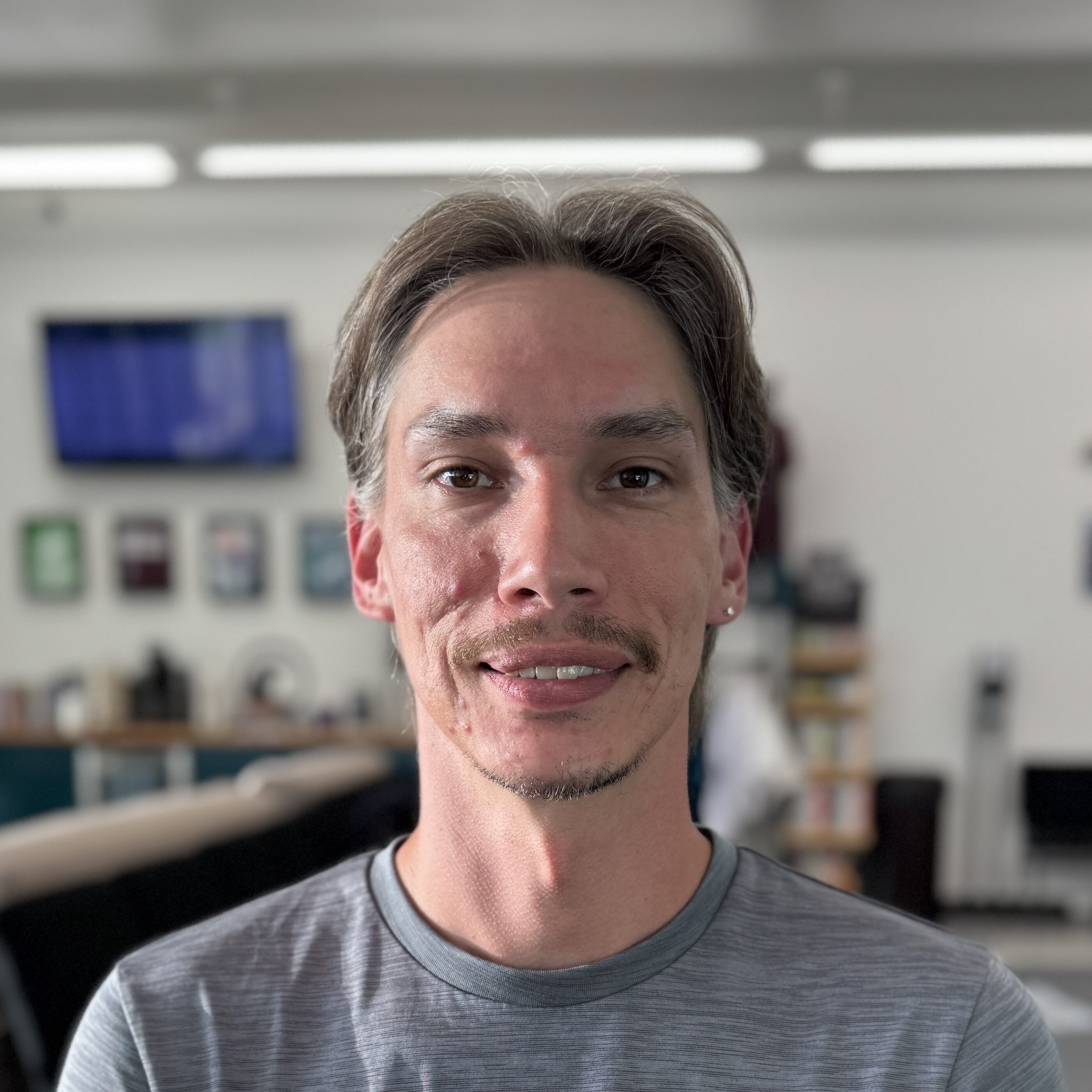In this episode of Inside the Wave, host Perry Wirth sits down with Coach Vern, Director of Martial Arts at Utopia, to explore the pivotal role of mindset in Brazilian Jiu-Jitsu and life. Coach Vern, a dedicated practitioner, competitor, and mentor, dives into the mental strategies he uses to face challenges, push past plateaus, and foster continuous growth. From stepping into a cage grappling match to embracing the mindset of a lifelong learner, Vern’s journey exemplifies how martial arts can transform the way we approach personal development.
This conversation is packed with insights into overcoming fear, developing resilience, and leading by example. Whether you’re a future white belt, a seasoned blue belt, or someone looking to improve your mindset on and off the mats, Coach Vern’s experiences at Utopia offer valuable takeaways.
What You’ll Learn in This Episode
This conversation with Coach Vern offers lessons for anyone looking to grow both on and off the mats:
- Stepping Outside Your Comfort Zone: Coach Vern shares how taking on challenges like cage grappling fosters personal growth and resilience.
- Shifting from Fixed to Growth Mindset: Understand the difference between these mindsets and practical ways to make that shift in different areas of life.
- Overcoming the Fear of Failure: Learn how facing failure in training can build resilience and confidence in everyday life.
- Practical Mindset Tools: Discover actionable strategies like challenging absolutes, positive self-talk, and reframing obstacles to unlock personal development.
- Leading by Example: See how Coach Vern’s dedication to competing inspires student athletes to embrace challenges and continuous improvement.
Standout Quotes from Coach Vern
- “One of the things that athletes are afraid of is that fear of failure. When you get through that obstacle in your own mind, everyone’s just proud that you went out there in the first place.”
- “Mindset is how you approach your everyday life and the obstacles you face. It’s not just rah-rah positivity — it’s about checking in with yourself and taking action.”
- “You can have a growth mindset in one area of your life and a fixed mindset in another. The key is being conscious of those differences.”
- “Thoughts become words, words become actions, actions become habits, and habits become your identity.”
- “Let them fall, but support them as they get back up. That’s how you build resilient kids.”
Stream Episode 10 Now
🎧 Available on:
About Utopia
Utopia is a community dedicated to personal growth through martial arts. As a space where individuals of all ages come together to challenge themselves and support one another, Utopia embodies the values of mentorship, discipline, and resilience. The Inside the Wave podcast amplifies these values, sharing stories and lessons that inspire listeners to grow on and off the mats.
Why This Episode Matters
Coach Vern’s story is a powerful testament to the importance of mindset in martial arts and life. His experiences demonstrate how stepping outside your comfort zone, embracing challenges, and fostering resilience can lead to growth on and off the mats. As the Director of Martial Arts at Utopia, Vern’s approach to mentorship and personal development reflects Utopia’s commitment to helping students become their best selves. Whether you’re new to BJJ or pushing through plateaus, this episode provides practical strategies and motivation to fuel your journey.
Join the Conversation
Like what you heard? Don’t forget to subscribe, leave a review, and share the episode with your network. Stay connected with Utopia and Inside the Wave for more inspiring stories from thought leaders in the martial arts community.
Transcript
Perry: Episode 10 of the inside the wave podcast with the real deal Coach Vern, thanks for having me back man director of martial arts at utopia fresh out of the cage
Vern: Yeah, I did a cage grappling match. How did that go? It was, it was fun. So, uh, last minute, Bob Duffy, um, a friend of ours, previous podcast. Yeah, he was on here and, uh, he, he just sent a SOS on social. He says, Hey, I just need a couple more bodies. So. I signed up for a body. I’m in, I’m, I’m, I’m someone. Yeah. So, and then, um, yeah, so had a, um, competition in the cage first time and it’s for charity, right?
Perry: For charity, police officers and firefighters and ideal situation was they fight each other. Yeah. Right. However, there’s not a ton of them. that fight, especially at the same skill and weight class and experience. So they’ve ventured outside to find great people to participate in matches to raise money for charity, which is Yeah, it was an awesome event.
Vern: Great turnout. Great. competition asked by a lot of community. So, you know, it was definitely a real match. Yeah. It was against a real skilled opponent and, but we had a lot of fun with it too.
Perry: So it was a great experience. Some of our, some of our members, even, uh, well, I know one of our kids students went there to watch you, uh, which is to Mark. Yeah. Which is cool to. To put on display, let the kids see like how you step up outside of your comfort zone.
Vern: Yeah. Yeah. Lennon was great. Um, she high five me before and after. And one of the things that a lot of. athletes are afraid of is, is that fear of failure. And when you get through that obstacle in your own mind, you know, no one is upset. No one’s disappointed in you. Everyone’s just proud that you went out there in the first place.
Perry: And it’s so funny. That’s not funny, but How much, how often do you lose in a night of training? It’s all the time. Like literally in an hour of training, you lose whether it’s a tap out or it’s like you lost position or you went for a move and it didn’t work. But then when you do it on display and it’s in a cage in front of other people that are kind of even half-ass watching, right? It’s like a totally different experience.
Vern: Yeah, it’s different. Walking into that cage, I walked in and I looked around and I said, this is real. This is different. And it was exciting.
Perry: It was for sure. It definitely went better than one of my first cage grappling matches where I went up against a 300 plus pound guy without a shirt on. Oh man. I have a video of it, man. I was in deep half under the guy, no shirt on. And he was just laying on top of me like doing the splits and deep half. And I literally remember having to move skin away from my face. So I hope I’m not dissuading anyone from training. I will find the photo. I have the photo of it somewhere. You just got to do some research and like Scott Houston in one corner. Um, and Friedland in the other Scott was just watching, but he was like coaching me. And I just remember like none, neither of them knew how to coach me out of the situation. Cause it was just so big. They’re like, try to move. Yeah. But like you go against someone like that, and you’re like, you know, slap hands, bump fists. You’re like, Oh, I can’t get gi grips. Do I go for a takedown? Because I’m going to turn out like a pancake.
Vern: Yeah, there’s just like so much mental jiu jitsu happening, like physical, physical jiu jitsu before. Yeah.
Perry: Yeah. Cool, man. Well, I I think that’s really, really fitting subject that you stepped outside your comfort zone because today we want to talk about personal growth, mindset, fixed mindset, growth mindset. But let’s start out. What is mind? What is, what is a mindset?
Vern: Yeah, it’s, it’s how you approach for, for mindset. For me, it’s how you approach your everyday life and different aspects of your life. A lot of people think personal development is a lot of like rah, rah, everything is positive. Yeah. But, but personal development and mindset is really about how you check in with yourself and how you approach obstacles in your life. And as we talk about mindset, we’ll talk about the different mindsets that someone can have. Yeah. Um, the big two are like growth mindset and then fixed mindset. So it’s really good to like define those and then, you know, build some strategies around that. So we’ll probably discuss all of that in great length.
Perry: One of the best definitions of mindset, and I think we mentioned it even on the podcast I did with one of my coaches, Mark England, it’s. The story about yourself that you tell yourself. Right. Right. And it comes down to communication. And that story, just like any other story, the words you say are important. How you say those words are important, like the tonality of words are important. The cadence of those words are important. So I always like circling back to, we talk about a fixed mindset or a growth mindset. What does that story in their head look like in each of those situations?
Vern: What does it look like? What does it feel like? What does it sound like? And those are like the big things. And speaking on that, and I think Mark talked about is thoughts become words, words become actions, actions become habits, habits become like your destiny, right? So like, where can you start making some of those small shifts, and you can start making those small shifts in your thought patterns, and eventually turns into that, you know, you say destiny, but it’s, it’s also that identity change, right?
Perry: Correct, right, where at some point in time, You started off as someone that started jiu-jitsu and then you built the habit of doing jiu-jitsu and then you got into coaching. But at some point in time, like you became a coach. At some point in time, you became a person that does jiu-jitsu. Like there’s no question about it. You don’t think about it. It’s part of me. It’s something I do. Correct. The reps. A lot of reps. That is it. So let’s talk about the hoo-rah-rah.
Vern: About personal development. Yeah. So, and this we’ve had, me and you have had really some great experiences and some of the coaching groups that we’re in. Um, I’ve had a lot better of experiences. Maybe you haven’t. And that kind of led you to getting some good people, but there is a, there’s a notion of this personal development that we’re all sitting in a room. We’re all drinking the Kool-Aid it’s like a cult and all of it is thinking about like positivity. Yeah. And in what real personal development looks like. And I, I like to use a story is imagine you have a garden, right? And this is goes into mindset as well. You have a garden and you start to see weeds pop up. A lot of people that think about personal development is those weeds pop up and you’re like, that’s OK. That’s supposed to happen. It’s all right. It’s going to fix itself. Personal development and an effective manner is I have weeds in my garden. that’s a problem and I need to create some action. I need to get rid of those weeds. And so- You need to decide and do. Decide and do, right? So, and this fitting, this is one of my favorite sweatshirts, by the way, Perry got this for me at one of our events.
Perry: You know, I wore my Average Sucks one last night.
Vern: I love it.
Perry: I probably wear it to bed every night. Fun fact, do your pockets connect in it? They don’t.
Vern: I know. That’s so cool. Then I don’t have to have the big kangaroo pouch. I know, tangent. I don’t lose my stuff. Cool sweatshirt. But yeah, so, so, and then there’s, then there’s this, uh, like a counterfeit growth mindset where, you know, that there’s a problem, but you don’t have the courage enough to like do anything about it. So you’re the, so that’s like a lot, like the victim mentality where like, Oh, Why does it have to be me that has weeds in the garden?
Perry: When everyone that has a garden has weeds. And that victim mentality, it’s a bitch. It is. Right? It’s not something that just, you can just get rid of.
Vern: Yeah. And it’s easy. It’s easy to have it. It’s fun to have it. It’s fun. You get to create stories and get attention. You always have a story to tell someone.
Perry: Always. Always. So what does a person with a, you know, that has gone through personal development that has built up skills and tools. What what do they do with the garden? Yeah, just blowtorch that bitch or what?
Vern: Well, so so that’s where like choices come in to play and and personal development is, is a toolbox. And through that toolbox is a bunch of different tools. And some of them are effective. It’s kind of like you’re building a house. It’s like, could you build a house with just a hammer? You could, but it’s going to take forever and it’s probably not going to look very pretty. Yeah. So it’s. Taking all of these tools. And when we’re talking about mindset, mindset is a tool that is utilized, but you also have other tools like goal setting and introspection and meditation and, you know, gratitude, gratitude, journaling, all those things. So it’s a collection of use, utilizing all of those different tools within personal development to, to get to where you want to go.
Vern: Nice. Is torching the garden a good idea? I don’t know your situation. Yeah. You know, I have some ideas, but I’ve gotten out of giving people advice because I don’t know your life story. Yeah.
Perry: So what are some of the, the tools you use on a regular basis?
Vern: So for, for me, I would like to think growth mindset is very nuanced today. We’re going to talk about it in general, but with growth mindset, You can have a growth mindset in one particular area of your life, but have a fixed mindset in a totally different area. And one of the examples I use is a lot of people that get into jiu-jitsu and they love it. They, they start developing a growth mindset. They start seeing the results and they’re like, okay, I can get really good at this. But then they’re a fixed mindset in relationships. So they’ll say, I can’t ever find the right person or I’m always getting dumped or there’s no good people out there anymore. And those are fixed mindset beliefs. And it comes down to limited beliefs. So you can have a growth mindset in different aspects of your life while still maintaining fixed mindsets and others. So it’s being conscious of those and using what I what I use is is this the truth. Am I using an absolute here? Yeah. And that’s like one of the biggest, and I use that with other people always, never. Yep. So, so that’s the biggest tool. And then I look at where I’ve been, look at the obstacles that I’ve already overcome. And when it comes to like a new challenge, I say, well, I’ve made it through a bunch of other things. Yeah. I can make it through this as Yeah. So that’s probably, those are like my big top growth mindset tools.
Perry: It’s a, it’s a huge tool that I use, you know, in our kids’ classes, for example, right. A kid comes in and it’s like, school is tough today. Like the whole day, like every day of school, like at what moment did it become tough? Like it was tough from the minute you walked in the door, you know, was lunch tough? Was recess tough? Was just, was reading tough? Um, you know, a lot of times we. Set absolutes and we don’t even use those absolute setting words. Like I always get dumped. School is always hard. I think one of the, man, one of the best tools that I do, I use is really trying to be precise, right? Like what, what exact, what exact thing is tough? Man, my Jiu Jitsu sucks today. Maybe my side control escapes suck, right? It’s probably not all of my jiu-jitsu. It’s probably one specific thing. Or maybe it’s like, man, I just fucking sucked at getting on under hook.
Vern: Yeah. Yeah. That’s a crazy concept because a lot of people at the Academy were talking about cage grappling and a lot of people are like, how, how was your match? I said, I think it went really great. Yeah. I, I had really great control. You’re like on top the whole time. And then, and then I mentioned, I was like the very specific thing that happened is I got gassed in the third round. And I couldn’t posture up anymore and he got a triangle. And so like, and it’s really powerful when you can take an event that is universal and then start attaching different like meanings to it. And when you attach a different meaning of Mark England, you get, you get a different emotion. You know, and I know Burnoff talks a lot about that as well as. You can take an event and make it whatever you want.
Perry: And you apply a label to it, right? You can’t change the event, but you can change the label that you put on it. Yep. Pretty cool. P.S. One of my, I think it was my first jiu-jitsu match ever. One of my first jiu-jitsu matches, I lost from a triangle. Similar match, like on top the whole time. The guy starts to go for a triangle. I was like, man, I know a triangle defense. I’m just going to pass the guard with this thing. Yeah. And he just like slaps it on tap, tap, tap. I’m like happens. Never doing that again. Lesson learned. It happens. Lesson learned. Was that was the biggest thing you learned in your match?
Vern: I learned. I learned that my top game matters. Yeah. Um, previously to, to that event, I used to play a lot of bottom open guard and just kind of like work through without any game plan that I went into the match. I said, Hey, I’m going to try to get a takedown and I’m going to establish top position. Yep. So I, so I learned that works.
Perry: Hey, get on top, stay on top, right? Like fundamental beliefs, the goal in jiu-jitsu. Do you need a sick ass bottom game in jiu-jitsu for sure? Because you’re not going to start on top of everyone.
Vern: Yeah. So, so my game, I had a game plan. So I learned that having some sort of conceptual game plan works a lot better than just going to a match. Hoping for the best. Yeah. So, so I learned that and then I just learned that, Hey, I do need to work on a little bit more of my strength and cardio. Cause I’m, I’m a runner. I have the rucksack, but I need to do strength as well as like cardio and find some balance between those two.
Perry: Yeah, I know a good strength training gym. Yeah, I know. I know you got one. For those of you that don’t know our podcast crew owns one of the runs one of the sickest gyms in Milwaukee social candy. So yeah, it’s a secret. It is secret. It’s a secret that if you’re interested, I know someone. I know someone that knows someone. Uh, so man, fixed mindset, growth mindset. A lot of people aren’t gonna, gonna know this is becoming more and more popular, right? Uh, let’s talk about that. Yeah. So what’s the difference? How do you get there? How do you get out of there? How do you shift?
Vern: So, so growth mindset is like one of those key terms that you kind of hear a lot of, but I think there is. There’s like a common knowledge aspect of it, but let’s like define fixed mindset. Fixed mindset is the belief that everything is set in stone, that your beliefs, your values, your actions, who you are as a person, your environment, all these different aspects of your life are set in stone. They’re never going to change. You just who you are, you are who you are and there’s nothing that can change about it.
Perry: Man. So. It’s like the opposite of extreme ownership, right? It’s like the lack of ownership. Correct. You know, you’re just going to let life happen to you. That doesn’t sound fun.
Vern: No, it doesn’t sound fun, but when we talk about stories, they tell a very attention oriented story. Yeah. And it’s true. And they’re exciting. Tell me more. Tell me more about all the suffering and all the pain and everything that hasn’t gone your way because people are empathetic and they’re caring and they’re kind and we want to listen and we want to help. Dude.
Perry: And then the worst is when you have two people that like battle at whose story is the worst.
Vern: First one to the bottom. What a terrible race. Yeah. So, so the, the thing with the fixed mindset, like, and if you have a fixed mindset or if you’re trying to help someone with a, with a fixed mindset, the first thing you have to do is just like validate. I think, I think it’s important to say, Hey, I S I see you. Yeah. I hear you. Everything that’s happening. Probably the worst thing that’s ever happened to you. And then getting them to think logically and ask those questions. Is it always this way? Yeah. Or is, you know, are you never satisfied? And then go emotional with it. And then one of the strategies that I use with that logical and emotional, I say, well, well, tell me like a contrasting statement. Like if you’re feeling down, well, tell me like a time where you felt happy. Hmm. And then you’ll get a story from that. And you’ll ask like, well, are you doing those things anymore? Do you still have access to that part of your life? And then slowly giving them the affirmation that they are great, that they do have potential, that they do have these wins and celebrate and collect those wins over time.
Perry: Yeah. I mean, I found similar that you, you often just need to open up people to the idea that it could be different. It’s like a new idea. Right? Where they get so good at telling their victim’s story that you need to find an out, help them with an out to tell a new story.
Vern: Yeah. And then I think vulnerability is a big part of it too. It’s, we’ve all been there. We’ve all said things that, you know, was a limited belief. And I think opening up yourself to someone else and say, Hey, like, I don’t know what you’re exactly going through, but, but I’ve been somewhere similar and here’s what I did. And one of the biggest things that I ask is I ask if they are open for an alternative. Are you open to a different perspective on this? Do you, and then the three H’s, do you want, do you want help? Do you want to be heard or do you need a hug? You know, and I think that we always go into this problem solving mindset when we’re trying to help someone else. But I think a lot of the times we have to be open to just them venting about it and then asking, Hey, do you want to change?
Perry: Yeah, man. And I feel like we often end up, I shouldn’t even say we, some people often end up on either spectrum, right? So someone tells you their, their story, their victim mindset story. One of two things happens that don’t result in good things in either direction. Number one is you try to fix it right away and you get hard resistance because they’re not open to fixing it. You have to remember that people love the story that they’re telling and they’re damn good at it. The other side, and question for you on this, trauma bonding. Are you familiar with that? I am like, someone tells you that story, you actually bond over that trauma, and you kind of feed into that story. Yeah, that’s oftentimes where you get the two fixed mindsets in the room, they start like, whose story is worse? And our best friends because we have a terrible story. Like, how do you like neither of those end up being a good result? Right? How do you stay towards that middle? How do you detach from the trauma bond but also show empathy? How do you help them without being pushed away?
Vern: That’s a great question. My answer for that is their problem is their problem. A lot of times we get so emotionally invested that trauma bond, like, Oh yeah, I’ve gone through something horrible too. And right now in this moment, it’s not about you anymore. It’s about helping that other person in whatever regards that means. So the biggest tip for helping someone is communicating for them.
Perry: Yeah, because, man, I feel like sometimes when you try to show empathy with someone or sympathy, two different things, but you know, someone tells you that story, you want to share a moment in your life that was like, just to just to show that, like, I get you, right. So I share a story around the same lines that happened to me that shows I get you. That doesn’t necessarily serve the conversation, right? You don’t need to do something. You don’t need to have that trauma bond to show empathy or sympathy. That is correct. I agree. Um, it’s hard to be mindful of that. Yeah, I agree. I feel like it’s one of those things you just need reps and reps.
Vern: And it definitely can be a trap. Um, being conscious of it and putting yourself in, in their position doesn’t always necessarily mean you need to tell your story for that for them to like, understand. I think most people will, we’re all humans and we all have these events in our lives. And when you can kind of disassociate from like what they’re going through, you have, it’s like watching a movie.
Vern: Like you’re watching the thing unfold as you’re watching a movie and you can change the script and you can, you know, focus on something else and look at it from a totally different perspective versus that person actually being in it. You can kind of see some different angles.
Perry: And it reminds me of, it’s like an NLP hypnotist thing. I’ve read totally about this one, the movie. Um, probably not. Probably, probably not. So, uh, man, like if you have a big, if you have a picture in your head, like if you’re a visual person and you see something that’s happened to you as a, like a picture, like a hypnotist, hypnotic therapy way to do it is to picture yourself in a movie theater, watching the movie. Right, so you’re not in the movie, but you’re watching yourself in the movie, which is like one removal of like detachment. Got it and What you can do it’s wild. I’ve done this before You can change the movie like you can slow it down. You can make it black and white Whatever it might be to reduce the intensity of it. Like you can like take your glasses off and make a little bluttery Right, so you reduce the intensity then you can detach more so pretend you’re in Um, by the projector, watching yourself, watching the movie. Right. And you could keep detaching like that to reduce the impact that that visualization makes on you. It’s like, it’s just a super, super weird thing.
Vern: Yeah. One of the, I have a tool that’s similar to that, especially when kids are saying like, I can’t do something or, or no one likes me. Um, I make them say it in a Mickey mouse voice. Yeah. And it makes it like sound really silly and it messes up that pattern where they, they had that attachment where they’re sad when they say no one likes me.
Perry: And that’s, that’s a great one for auditory, right? A lot of times when we, when we have these. These struggles that we’re having, these road bumps, these fixed mindsets, they show up differently for different people, right? Some people see it visually. They paint the picture in their head. They see the movie play out in their head, right? It might be a thing that you say to yourself, I’m not good enough. I can’t do this. Nobody likes me, right? That’s not a movie. You don’t necessarily see that as a picture unless you do see that as a picture. But a lot of people, that’s words in their head. So how do you change those words in their head? Well, say it twice as slow. Say it with a different tone. Say it backwards, whatever it might be. Then kinesthetic people, try to move where you feel it. If you feel something and you feel it in your chest, try to move it to your shoulder. It’s just so weird that don’t knock it unless you try it because it may give you a 1% advantage. This is something that we talk about as part of our core values at Utopia. If it works, it made you better. If it didn’t work, you’re in the exact spot that you were before. Give it a shot. It’s like a multivitamin, right? I take a multivitamin every morning. I don’t know if it actually helps, but it might.
Vern: Might. No harm. Right. Awesome. So I think, I think we covered fixed. Yeah.
Perry: I think we got that. And, and slightly like how to shift people out of it. Yeah. So what is a growth mindset though?
Vern: Most people. when they are born and I’m rolling out like cognitive or neurological or like physical limitations, but, uh, their baby. And then they, uh, they observe their environment and they are starting to see people move around and they’re like, I want to do They start crawling. They don’t know what crawling is. There’s no seminar. There’s no three day, you know, workshop. There’s no instructional on that. And then they start saying like people, I want to walk. Yeah. So they stand up, start walking, trying to start walking. They fall down, you know, and then they, they keep going and they keep trying and they keep trying. And never once has a baby like, I don’t want to do this anymore. I think I’m just going to stick to crawling. So instinctually we have adopted a growth mindset. as a child and around four to seven years old is when we start getting these outside influences where we can’t do something. Stop doing that. You’re not allowed to do that. Oh, you can’t do that. And then they started like our family. Yeah. All right. Don’t do that. Yeah. And then they maybe that was the intention was pure. as usual, but then they start saying to themselves, well, if I can’t do that, I might not be able to do this. And I can’t do that. And I can’t do this and I can’t do this. And they start telling themselves that over time. And then they shift to a fixed mindset.
Perry: Man, I, I remember as a kid, like, you know, um, the fitness tests in school, Right. Where you got to go up there. We got to do a pull up. There’s like two pull up bars in class. So everyone’s watching you. Right. So you go up there, you go do a pull up and you can’t do one. And I instantly was like, man, I can’t do a pull up. And then the teacher’s like, you could do a flexed arm. You can’t do a pull up. You could do a flexed arm hang instead. It’s like, I can’t do a pull up.
Vern: Like, thanks for the label. Yeah. Thanks. So, so everyone minus disabilities or, you know, all those, Ever there, they’re developed instinctually with a growth mindset. So what do we do when we have a child that has that? We have a student athlete who is just a growth mindset kid. They are one already. They are one already. Okay. So how do, like, how do we still build that? Because if we’re just paying attention to all the fixed mindset people in the world, those growth mindset people, they won’t continue to grow because they don’t have the challenge. Yeah. And that’s the biggest thing for growth mindset individuals is they need a challenge and they still need a little bit of affirmation. They still need like to be acknowledged for like the hard work that they’re putting in. Yeah. but those kids really need the challenge to push them further out of their comfort zone or they’ll get bored. So, and then for adults as well, if you are a growth mindset, like a true growth mindset across the board and finances and your business and your relationships. Like what can you do to step further out of that comfort zone? Maybe you take a cage grappling match. Maybe you hike. Maybe you do something that you’ve wanted to do, but something for whatever reason has kind of prevented you up to that point and do that thing and just keep adding to that resume of all those things that you’ve accomplished. David, David Goggins talks about the cookie jar and that’s more for like the people that are struggling with fixed mindset. But man, look at that cookie jar. When you’re a growth mindset, you’re like, I need to add something more. I need to go above and beyond. I need to go to the boats. I got to who’s going to carry them, you know? So, um, I think that’s a really good strategy for growth mindset. People is what else can you accomplish? Yeah.
Perry: Do you, so do you think it’s more important for adults to have a growth mindset or kids or both? And do you see like a relationship in it? Like, you know, if a kid has a fixed mindset, you can oftentimes look at that parent is like, Oh, that parent has a fixed mindset as well.
Vern: You could, you could definitely see like correlations with that. I think both need to have. and adopt a growth mindset for different reasons. One, kids are more malleable. Yeah. So if you can get them in and out of fixed mindset and growth mindset, just the situation based. If that kid stays a fixed mindset kid, they’re going to grow up into a fixed mindset adult, unless there’s some extreme intervention. Maybe they, maybe they have that friend that doesn’t give up on them. And this says, Hey, like they have an event and they slap a great label on it. Yeah. So like, Hey, like, You can do something about this. A lot of, a lot of people that with that fixed mindset, they do believe that there’s no hope that nothing’s going to change. So I would say, I would say it’s important for both one for parents and adults to adopt it because that’s what the kids are looking up to. Hmm. That’s what the kids see and they’re trying to model. So when you’re using growth mindset language, a lot of that trickles down to the kids, you know, and like teachers and, and parents and coaches like that, that’s who they’re spending their time with a lot. And then developing friend groups within those communities, having that support that’s positive versus having the friends that you can just get that are usually the troublemakers and.
Perry: Man, and for adults, it’s, it’s being congruent with it as well, right? You can talk growth mindset all day. But if you’re not showing that growth mindset, like yourself jumping into a cage in front of your students, like, that’s speaks way more volumes than talking about growth mindset. Like, hey, guys, you should go compete. It’s great for you. You stepped up and you went and you did it. Yeah.
Vern: I will tell you the only reason why I compete is because we talk about competing. Yeah. I, I, I love the art of jiu-jitsu. I love coaching jiu-jitsu. I don’t compete for me. I compete just to show up and show the kids that, Hey, like. If I can do this, you guys, you don’t need to do it for yourself. Yeah. I don’t need to do it for myself. You know, I’m, I’m happy with where I’m at with my jiu-jitsu, with, with my life competition adds another element to it. And I use it as a skills check, you know? So, and then I, I use those competitions and those grappling matches as a segue to like, Hey, I know I talk about this and I talk about the importance of competing. Watch me do it.
Perry: Do you think a fixed mindset is ever beneficial to be able to like turn one on, whether it’s like a high pressure situation, wherever, where you just need to focus on stability and like, I just, all I need to do is stay here. I’m good to go where, where I’m at right now. I shouldn’t focus on growth.
Vern: I think we’re like a piece of armor. I think that fixed mindset and And being content, I think are two different things. Okay. Yeah. I, I think being fixed is I can’t do anything about it. Being content is I don’t need to do anything.
Perry: Yeah. I don’t need to be in growth mode right now.
Vern: I don’t, I don’t, I don’t need to, to, you know, focus on my business as much. I need to focus on my family more. I don’t need to focus on getting more money. I need to focus on my health more. So with, with that, I would say there’s aspects of your life that I bet you’re probably content on. And I wouldn’t necessarily say you’re a fixed mindset in that. I think you’re just, I think you’re okay with where you’re at, but I also would, would recommend looking at the areas that you maybe have neglected or need some improvement on and see where your mindset is in there and see if it is a growth mindset or a fixed mindset.
Perry: Let’s talk about participation trophies, participation awards. We’re very, so we use them at our academy when we do our in-house tournament. We’re very select with it for certain age groups.
Vern: It is a strategic participation trophy. Not everyone gets them. We view at a young age, if you compete, you show up and you perform. And I think it’s only for our five-year-olds, which is five and under, five and under. If you compete, you showed up and you performed and you did your match, regardless of if you won or lost, you showed up and you, you won.
Perry: They’re young enough that awarding them with a participation trophy encourages a growth mindset for that developmental stage for the kids. Yeah. What happens when you start giving them to everyone?
Vern: I personally think when you hand out participation trophies to everyone, I think the kids that get them feel worse because they know that part of them feels like they don’t deserve it. You got that medal for last place. And then I think on the opposite side of that with those high performers, they’re like, well, it doesn’t matter if I try my best, I’m still going to get a trophy. Yeah. I don’t have to work that hard. I don’t have to work that hard. And then that does not play out well in the real world when you’re in a competitive job market or trying to get into a competitive school or. ain’t x, y, and z trying to find your spouse. Yeah, you know, all those things that that translate to parts of those, you know, early childhood development areas in your life.
Perry: Man, it makes me think of one of my I had a huge breakthrough a couple years ago on limiting beliefs. And we know limiting we talk limiting beliefs create a fixed mindset, right? You know, one of my old ones that used to trickle through my head, and it still pops up, they always do. Uh, you know, I’m not good enough. Obvious one. I feel like a lot of people have that one. We recognize that that is one. Um, the other one that hit me like a 80 pound bag of bricks was. I’m already doing well, or like, I am good at this. Right. Which is interesting because a lot of people have to have the limiting belief of like, I can’t do this. But another deadly one, it’s a hidden one, is I am good at this. Because the second you say, I’m good at this, it gives you a out from needing to become better. And I feel like participation trophies are, it’s kind of like giving myself a participation trophy. Like, hey, I’m giving myself a trophy, I’m good. But I’m good enough that I don’t need that first place one. Yeah. Right. All I gotta do is go out there and do it. I’ll get a trophy no matter what.
Vern: Why work harder? Good is the enemy of great. Quotes.
Perry: I love them. Quotes. One-liners. Well, what else do we have for, for mindset?
Vern: I think, I think we covered, I think we defined them really well. I think we gave some really good strategies. I think in order to understand and try to help other people. I think it’s really important to, to do some self-reflection on like the areas where you may be having those limited beliefs, where you think you’re doing really great in the growth. And I think a lot of that just comes back to like, where, where am I at? Where, where am I on my journey through life? Where have I had some challenges. And I think having that holistic approach helps you grow and it helps like other people around you. I think, I think the biggest thing for people is if you want to be a, like a person of influence or you want to be a leader, you want to rise above is, is doing the things that you want to do. Because when you start doing those things, everyone around you starts seeing it. And there’s a lot of people that like get into jiu-jitsu or, you know, they see how we interact with the kids and they’re like, I want to be a part of that. I want to become a coach. I want to start attending classes. And we didn’t tell them to do it. Yeah. We just showed up and we showed up as influences. And, you know, the crazy thing about being in leadership is never once do I hear you say, I’m the leader. I’m the person of influence. I’m there. I’m the guy. It’s just, you just keep showing up and, and. And improving every day and you’re improving yourself. And that trickles down to the people that are watching and they’re like, I can do something as well.
Perry: You know, John says it right. Like when you’re that you have a microphone. know, whether it’s when you have a black belt, you’re in front of a group of people, you’re around people that look up to you that were even maybe that they don’t even look up to you, right? They look laterally at you. You still have people looking at you and you still have a microphone and know your words, your actions, your thoughts matter. Yeah, for sure. Man, I had something else.
Vern: I don’t know that happens. I don’t know. I
Perry: Uh, what else, man?
Vern: I think I, I think I, I got, I got notes, got your notes, but I think I covered it all. Yeah. No, it’s talking about flowers and babies and yeah. Are they open to different perspectives, man?
Perry: Do you think Mark martial arts cultivates a growth mindset better than other sports activities? We often talk about why we think martial arts is like, uniquely positioned outside of just athletic development, especially our program.
Vern: And viewers and listeners, he didn’t say better. We said we’re unique and different. Yeah. And I think that’s important because, and I think we we’ve touched on it before a lot of other sports and activities. They, they miss some of the marks and say, I like football, for example, because I played football. I played football, wrestled all the sports. And what if you have that kid that really just loves football, but he’s just not, he’s not athletically, he’s not physically there yet, but he’s intellectually, he’s emotionally, and he’s socially there. That was me. I love football.
Perry: I wasn’t fast enough to play any sort of running position. And I wasn’t big enough to play on the line. So I played on the line because who’s going to give the slow guy the ball. Yeah. I could cause less damage on the line. Right.
Vern: Yeah. So like looking at that, it’s, it’s like, what are you doing to that particular individual? Yeah. You know, maybe they’re physically there, but they’re not socially there. Maybe they’re like a rock star, but they just don’t have the social skills and what our Academy and what martial arts does is it incorporates all of that. It’s an individual journey. We’re part of a team as, as in like we train as a team, but everyone is like, we’re all on the same road. Some people are just walking a little bit faster. And some people, they think of this ascending staircase where people are like trying to climb over each other. And it’s like the bottoms are at the bottom, but it’s just a, it’s a straight road. And we’re all just like, might not feel like it sometimes. No, that’s another podcast. And so when we look at kids and we look at adults similar as well, we’re just big kids that grew up and I think martial arts just does a great job of setting the realistic expectation that it’s not you versus anyone else. It’s just you versus you. It’s you versus the version of you yesterday.
Perry: Oh, we try to make it that way, right? Some. times we get stuck in that thought pattern of everyone else is getting better around me, but I’m not getting better. And to your point, that’s what we need to not be focusing on.
Vern: Yeah. And in the case that because we have some members, they’re like, Oh man, he like, they’re getting so, so much better at the same time.
undefined: And he got my blue belt before me.
Vern: Yeah. And we have that. What are you doing about it?
Vern: You know, like, And you talk about this often. There’s like this unwritten rule about not asking about stripes and belts and all that. Um, but you’ve been highly approachable, but still, well, not a lot of people do. So, so we have transparency around ranking belts.
Perry: It’s one of those things like, uh, like how truthful do you want me to be? Yeah. Like, well, if you’re going to, if you want to ask about your rank, you like, you better be ready for truth about it. I’m not gonna be mean about it, but I I’ll give you the truth.
Vern: Yeah. And then it’s, it’s about, well, how, how often are you training? What are you particularly working on? You know, like they’re all the new focus span. Yeah. How consistent are you? Yeah. And then I’ve noticed a lot, a lot of it happens to do with on the mat leadership. Like how do you show up in class? Are you trying to destroy everyone or are you just letting like people work? Yeah. Are you, are you facilitating other people’s growth at the same time you’re growing? So there’s like a lot of nuance.
Perry: Like, are you trying to learn when you’re at class or are you just trying to win? Yeah. Or are you just trying to wreck people? Or are you just totally out of it that day? Or consistently? Yeah. Going through the motions sort of a thing versus trying to work on something. Having intent behind your training. Right? You know, we started off with the definition of mindset are the stories about yourself that you tell yourself, right? And your words matter, your tone, everything matters, right? So does your approach to training, right? Your intent behind it, your intent behind the words in your head. It’s all connected. Communication is one of the best spots to start with any challenge that you have. Firm believer and it’s not just external communication. Oftentimes. It’s how do you communicate with yourself? Which leads to? Your mindset. Yeah I did a really cool exercise once at a personal development meetup group Mastermind of business owners where we all brought one problem that we have Right. So give me a fictitious problem I’m overweight. Cool. I think you have a communication issue. And then you would start with that. And you have to be like, OK, why is it a communication issue? Well, some sort of story that you’re telling yourself in your head of why you’re overweight. Like, are you overweight? Are you overweight and you just can’t ever get any leaner? I just like starting there. Yes, your overweightness might be a genetic abnormality, 1000% caused by things outside of your physical ownership and control. But you can change the story that you tell yourself to change your mindset on it. Right. So next time you have a problem, tell yourself, I think I have a communication issue. Love it. Cool. Anything else before we do our rapid fire questions?
Vern: No, I’m ready.
Perry: So rapid fire questions, uh, unofficially sponsored by element.
Vern: I’m going to drink mine too.
Perry: When I say unofficially sponsored, I mean, did they not, not sponsor me at all, but I drink a lot of this. Not a lot like that. I’m consuming too much sodium, but it is one of our favorite things from all of our hard training jiu-jitsu athletes at our Academy.
Vern: Yeah. Delicious.
Perry: And I appreciate them for sending me really cool stuff all the time. They do. Thank you. So rapid fire question number one.
Vern: Okay.
Perry: What’s one habit that changed your life?
Vern: Doing jiu-jitsu.
undefined: What got you to do jiu-jitsu?
Vern: I was like, how’d you start that habit? So, so I, I’m a Jiu Jitsu guy. No, no. I’m, it was a series of small steps for sure. I moved back to the Wisconsin area, lived in Grafton. Neutral ground was there. I did two weeks.
Perry: Who brought you in? Anyone? You just showed up.
Vern: I just, I just Googled it. Heard about Jiu Jitsu. Yeah. I heard about it. Let’s go try it out. And then, uh, And then I was like, maybe I’ll do it. Yeah. And then one day I said, nah, I need to do this.
Perry: And little did you know that it would turn into a career path.
Vern: That’s crazy. Yeah. So yeah. Jiu jitsu was probably the best habit that, that I sent me on this trajectory and I wouldn’t be sitting here.
Perry: If I put you on what Jocko calls the path, the path. Love it.
Vern: Cool. You want to do all yours or do you want to go back and play ping pong? All right. If you could swap lives with any cartoon character for a day, who would it be and why? Cartoon character? Yeah. We can do anime superheroes as well.
Perry: I think Roadrunner. Roadrunner. Dude, he’s fast, clever, super clever, like ducking traps all the time. Gets a laugh out of it all day, right? Cause he spins those, he like reverses and counters those traps on Coyote. Just so fast, man. He’s got a branded relationship with Acme Corp. Yeah. Right. So he sponsored athlete. Roadrunner. I love it.
Vern: I love that answer.
undefined: What’s your answer over there?
Perry: I don’t from rocket power to rocket power.
Vern: We can do, we can do, we can do, we can do that. I missed that show. Mine would be the Hulk. Obviously.
undefined: Okay. Question number two.
Perry: Why the Hulk? That’s actually on my list. Really? It’s actually question number six.
Vern: Why the Hulk? It’s a rapid fire.
Perry: That’s not a cartoon character. That’s a superhero. Yeah, but he has a cartoon.
Vern: Continues. Live action. So, so the whole, I have a really interesting relationship with him as a kid. Not him. Okay.
Perry: Well, Mark Ruffalo or Eastern Wisconsin.
Vern: Cut that out. No, the comic book. So Lou Ferrigno, he was the original Hulk, the TV series. And we didn’t have a lot of channels, but we had a channel that had the incredible Hulk. And when I was a little kid, I would try to rip my shirts off to the point where I wasn’t allowed to wear shirts in the house anymore because I would just rip them up. And I just was really fascinated at a young age. You just ripped up all your shirts in the house? Yeah. I wasn’t strong enough yet, so I would just stretch them. Cut it? I would cut it a little bit. Yeah, I stretched the first couple, but I would snip them and then I would just rip them. I’m like, yo. Would you make sure you had an audience or you just do it in the mirror? I would just do it by myself in my room. Okay. Yeah. Yeah. And then like, I just kind of grew like super strong. Yeah. And then like, as I got older, I appreciated the scientific part of Bruce Banner as well.
Perry: And that he was a scientist. Do you know the science behind the Hulk is not set pseudoscience.
Vern: No, it’s like real like stuff. It’s like gamma radiation. OK. Yeah, I don’t know, like what kind of you just shot with radiation. It was really cool. But yeah, he’s always been been like my go to guy. Cool. So you inspire you. Yeah. And when they did the MCU spoiler alert, there’s a smart Hulk and kind of combined like the strength with the smarts. And finally, like it’s like an internal battle and red Hawks coming out soon. I know.
Perry: I’m so excited. And we’ll see how that one is. Marvel’s been, it has some ups and downs lately here.
Vern: We’re going to have to talk about that. All right, here we go. What’s a piece of advice you’ve ignored, but later realized was true.
Perry: Uh, my mom would always tell me that I was burning the candle at both ends. Well, she wouldn’t tell me that I was but she’d like, make sure you don’t burn the candle at both ends. Right? Man, and the older I get, the more I’m just like, I need recovery time. Like I, I can work hard. I, I can burn the candle at both ends, but like, man, rest, recovery, sleep, having a day off, having time for free time. Yeah. Is, is incredibly important. I need to prioritize that cover next. What’s a mindset struggle that you’ve personally overcome? Do you ever get stuck in like a loop at some point in time in your life where like, man, you get stuck in one of those victim mentalities, negative thought patterns, squirrel story.
Vern: Yeah. I, I have a very dynamic blended family. that I made some very at the time decisions that have have impacted the rest of my life. And oftentimes before I started really developing some other strategies, I would I would say that I was a bad dad. Hmm. And what I had to and still do is I take every opportunity to make sure that my kids know that they matter, regardless of like how far away or if I’m like on a trip and I make drastic measures to make sure that they feel supported. Um, and that means long car rides. That means last minute cancellations with stuff at work and other commitments to make sure, like I go to the football game or I go to the musical or I do the thing. And, and so I’ve given myself grace that I’ve grown over the last 10 years in that, um, that no matter what, no matter where I’m at, no matter what I’m doing, that my kids know that their, their dad loves them.
Perry: I love that, man. And I hope, you know, I know when I kid someday that I’ll be the same way. I was actually just listening to Jocko did a podcast with his daughter on it. And he said something similar of, if you have the opportunity to take your kids out of school for a day, or to just like blow off an entire day and do something with them. He’s like, do it because those will create the memories.
Vern: Those moments, magical moments.
undefined: This magic moment.
Perry: My turn.
undefined: Yeah, go.
Vern: What’s your go-to mantra when life feels overwhelming?
Perry: I’ve done it before and I can do it again. That’s like literally that simple. Like I’ve been overwhelmed before and I’ve got out of it before. And overwhelming has never crippled me into the corner or anything like that. I’ve always figured it out. So I just tell myself, you got it. You’ve always figured it out. Shitty right now, but it’s got to be shitty before it gets great.
Vern: Yeah. Yeah. I asked coach drew these questions yesterday and he gave me goosebumps because he said, uh, this too shall pass. And, uh, it gave me goosebumps cause that’s my mantra for sure.
Perry: Uh, I got two more for you. Got it. Uh, number one advice for, uh, raising or coaching resilient kids.
Vern: Let them fall. still support them, let them get back up. Cool. Love it. If you could instantly master any skill or hobby, what would it be?
Perry: Man. The first thing that came to my mind was like jiu-jitsu. And then I was like, no, I don’t want to like, I don’t know. And this literally just all this thought just came through my head. I don’t want to instantly master anything. So I think that takes the fun away from it. I think the journey to mastery is what’s actually worthwhile. And that might be a corny ass answer. Yeah. So I’ll say breakdancing. Okay. Because I feel like that’d be fucking cool to just be able to like, I could just go right there and bust out a breakdance. Yeah, I felt the same like anything that matters to me. I want especially with the time I spent in jiu jitsu, trying to master jiu jitsu, whatever that may mean, like, I wouldn’t want to instantly master anything.
Vern: Breakdancing is a good one.
Perry: I was like, just like a backflip, man. I just want to be able to bust a backflip whenever I go and just know I’m not going to break my neck and I’ll land on my feet. Yo, yo, yo, yo, yo, and do some yo yo tricks. My last one, if you weren’t coaching, what would you be doing? If I wasn’t coaching. Not like if you never became a coach, but if you weren’t coaching, what would you be doing? It can be, it doesn’t even have to be a career path. What would you be doing? I could be flying a kite down at Bradford beach.
Vern: Yeah. If I wasn’t, if I wasn’t involved in coaching, I would, I probably would not do jiu-jitsu as much because jiu-jitsu It’s hard. I would probably still be like in the tech industry. Yeah. Probably sitting at a desk being miserable.
Perry: Okay. Oh, so this is like, if you’ve never started Jiu Jitsu, okay. A little bit different take than I was thinking, but continue.
Vern: Okay. And then like, if I wasn’t coaching like all the time.
Perry: Yeah. Like what if you’ve, you’ve been a coach and then tomorrow you’re not coaching, like, what are you doing six months from now?
Vern: Oh, it’s not that. Oh, six months from now. I love coaching, so I would probably still be coaching, but if I couldn’t pick coaching, I would probably be playing video games. Cool. What video game? Right now is Black Ops 6. Just zombies, just rounds and rounds of zombies just coming after you. It never stops.
Perry: Just do solo or just like online multiplayer?
Vern: You can do all of those. Sometimes you got to do a solo though, because sometimes they, Those random lobbies hold you back. Yeah. You got to revive them a bunch of times. I hear you. You got, you got any more? I have one more. One more. You are stranded on a desert, but, and you can only bring three non-survival items. What’s in your bag.
Perry: I’m in a desert and I can only bring three non-survival items. So nothing that’s going to save my life. Correct. What would be in my bag? Yes.
Vern: Uh, my solo, you are solo. You can bring Jeremy with you if you want.
Perry: Man, I don’t know. Nintendo switch. Okay. Solar power charger. No, I’ll get one more. Uh, the switch has preloaded games. I’m okay. I’m like, I’m outsmarting the genie here. I’ll get it. Um, man. It’s a can of element.
Vern: Nice plug.
Perry: Awesome. That’s all I got. It’s not survival. Cause I’m not going to survive off of one, but it’ll keep me hydrated for a little bit longer.
Vern: It’ll taste delicious. Oh,
Perry: Slow sips. We’ll show that in slow mo.
undefined: Well, man, I appreciate you coming back on the podcast. It’s always great having you.
Vern: We’re gonna make this a regular thing. We always have great conversations. Cool.
Perry: Leave us some reviews, some stars, and send us questions you guys want us to talk about, topics for next time. Yeah. Cool. Appreciate, man.






















